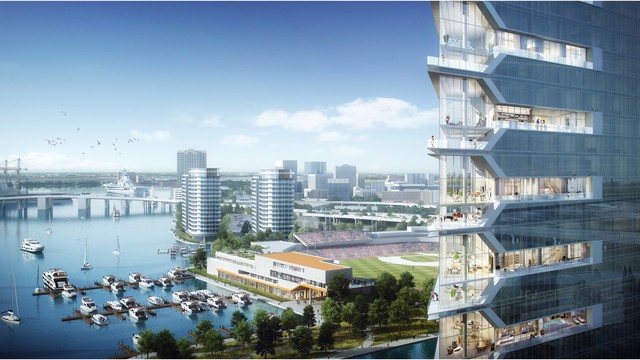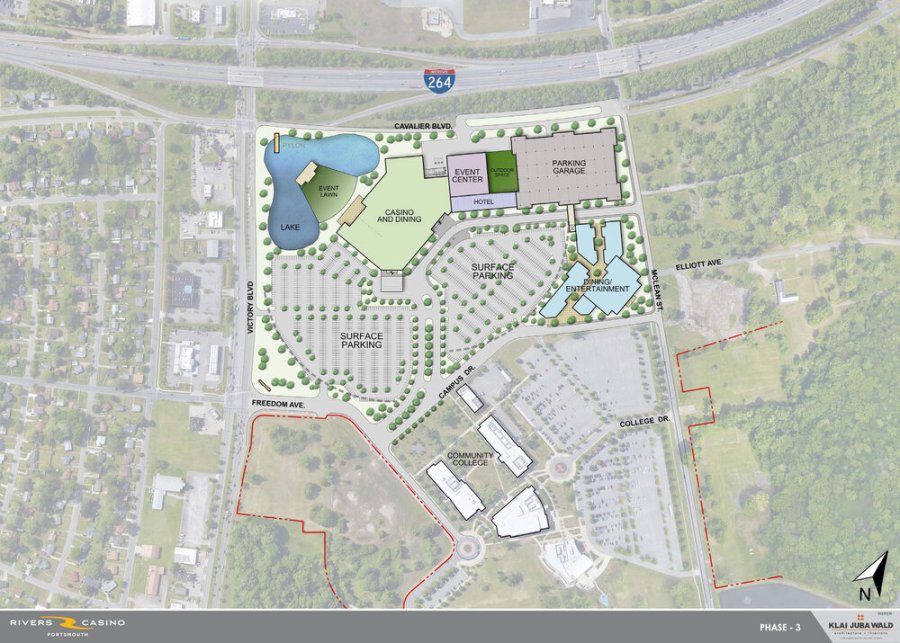PORTSMOUTH, Va. (WAVY) — From the beginning, Portsmouth’s casino project always included the development of a hotel.
However, the developer partnered with Portsmouth won’t be required to start building the hotel component of their project if a competing casino project — just across the river in Norfolk — gets approval from voters on Nov. 3.
Hampton Roads’ dueling resort-casino proposals live or die on Election Day. The state law allowing for such gambling to occur in five cities requires that a majority of voters in each of those cities approve of the plans via a referendum vote.
Since August, the developers hand-picked by both Norfolk and Portsmouth leadership to usher in the new-to-Virginia gaming industry have been campaigning hard in an effort to shore up their bet. Both are pushing out flyers and promotional videos that envision grandeur Las Vegas-style atmospheres coming to the area, along with promises to bring thousands of jobs and millions in taxpayer benefits.
However, the bar set by the cities — mandating exactly what must be built — leaves the potential for what is actually constructed to be short of what many would consider a “resort.”
The developer’s deal with Portsmouth gives them options to significantly alter the timeline of parts of the phased project if the competing resort-casino in Norfolk is approved by voters next month. That means the hotel portion of Portsmouth’s casino development — which is featured in promotional renderings — could be pushed back several years.
The agreement in Norfolk does not have any references to the Portsmouth project or other developments that may affect their timeline.

The site of Norfolk and Portsmouth’s proposed casinos are less than seven miles apart. Norfolk’s — which would be developed by the Pamunkey Indian Tribe in partnership with Tennessee billionaire Jon Yarbrough — is planned for just over 13 acres next to Harbor Park. Portsmouth’s — which has Chicago-based Rush Street Gaming lined up — would sit on roughly 50 acres south of Interstate 264 at Victory Boulevard.
From the beginning, there was skepticism that two casinos built so close together could also both be successful. While multiple consultants said they could both survive — with even another saying the market could handle three — the agreements binding the deals allow both developers to play it safe.
The Pamunkey Tribe says they will invest $500 million to construct a resort featuring 3,000 slots, 150 table games, a 300-room full-service hotel, steak and seafood restaurant, sports bar and grill, cafe, spa and 2,500-seat entertainment venue.
When looking at the option to purchase agreement — a deal with Norfolk that paves the way for the tribe to buy the land for the casino if the referendum passes — the city would still be required to accept a much smaller development to include a capital investment of $300 million — as required by state law — 750 slots, 25 table games a 150 room hotel, fine dining restaurant, sports bar and grill, cafe and 500-seat “intimate showroom.”
For comparison, Rosie’s in Hampton currently has 700 historical horse racing machines and most hotels near Norfolk’s airport have roughly 150 rooms.
In a meeting of the Norfolk Mayor’s Committee on Gaming in July, John Thompson — who works for Yarbrough — told members that “[The] Portsmouth [referendum] passing or not passing will have a material impact” on the size and scope of what is ultimately developed on the shores of the Elizabeth River in Norfolk.
At an event in August, Jay Smith, a spokesperson for the Norfolk project, said the tribe is confident the $500-million proposal is what will happen if voters approve.
“Those are all assumptions that Portsmouth also passes. So if Portsmouth also passes their referendum in November. We are not going to have to scale back,” Smith said. “It could be larger.”

Over in Portsmouth, parts of the project’s fate are specifically tied to the competing venture in the development agreement.
Rush Street Gaming is also guaranteeing a $300 million investment for their Rivers Casino. A birds-eye preliminary site plan on their website shows a casino, outdoor entertainment venue, restaurants, and a hotel and conference center. Specifics for the property haven’t yet been released.
The development agreement signed between the city and Rush Street Gaming lays out three scenarios that would force the hotel and conference center to be built.
In one of the scenarios, planning for the hotel and conference center only has to begin if the referendum in Norfolk fails. If Norfolk’s casino is approved, it must be open for a full year and net gaming revenue for Portsmouth’s casino must reach $175 million in that same time frame for the developer to be obligated to build the hotel and convention center. The third trigger would be for Portsmouth’s net gaming revenue to be $250 million in a straight 24-month period.
In a 2019 state report, consultants estimated Portsmouth’s casino $167 million in net casino gaming in 2025. However, that was with a 27-percent tax rate. The legislation approved by the governor sets the rate on the first $200 million at 18 percent.
A spokesperson for Rush Street Gaming directed all questions about the agreement to Portsmouth’s Economic Director Robert Moore.

Moore said voters should know the renderings and plans they are seeing are more of a final product.
“What they should know is that this is a phased approach. There are phases to this process and there are phases to this project and those phases could change,” Moore said.
The “casino phase” will come first which will include the entertainment venue and dining, according to Moore.
When it comes to tying parts of the agreement to Norfolk’s casino project, he said they knew all along market conditions would play a roll in what is ultimately built.
“We’re confident that Rush Street is the right partner and that Rush Street has done everything they need to and said they would do up until this point,” Moore said.
But in the case they don’t build the hotel and conference center, the city has the option to bring someone else on board to do it after the casino is open for four years. Moore is confident the city could make that happen, too.
The whole premise still puzzled Dr. James Karmel, a professor of History at Harford Community College who has studied and authored a book on casinos.
“I’m not too familiar with a bid that’s worded in that, with those types of contingencies,” Karmel said. “I can understand where that developer might be concerned though. Because these are going to be so close to each other.”
Karmel said that is hardly a first for the industry, however, and believes it could work.
He said if you look across the country, casinos in the same market often find success in their different branding.
“Really being effective in what I call ‘niche marketing’ toward certain populations and certain demographics, such as young men who like to play table games for example,” Karmel explained. “Those Virginia casinos have the benefit of the whole Hampton Roads area. Plus, I think [they] are going to get a lot of North Carolina revenue coming in.”
CORRECTION: The original version of this article listed the wrong minimum number of slot machines required in Norfolk’s offer to purchase agreement. WAVY-TV regrets the error.





































